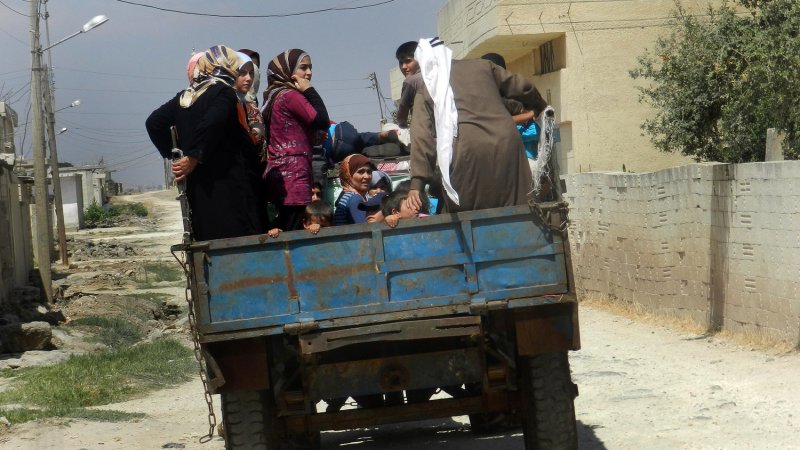Syrian civilians flee in a vehicle at Houla near Homs, Syria. UPI |
License Photo
DAMASCUS, Syria, Oct. 31 (UPI) -- The Syrian National Council is too isolated from events in Syria to lead opposition forces, U.S. Secretary of State Hillary Clinton says.
Clinton, speaking Wednesday at a news conference in Croatia with President Ivo Josipovic, said many of the SNC leaders have "good attributes" but have not visited their homeland in decades, Voice of America reported.
"There has to be a representation of those who are on the front lines fighting and dying today to obtain their freedom," she said.
Clinton said she hopes a united opposition to President Bashar Assad will come out of a meeting next week in Doha.
A four-day truce ended Tuesday, but observers said there was little decrease in violence.
The Syrian Network for Human Rights in London said an average of more than 105 people were killed every day during the truce period for a total of 421 deaths, including 39 children.
Chinese Foreign Minister Yang Jiechi discussed proposals for resolving the situation in Syria Wednesday with U.N. Special Envoy Lakhdar Brahimi, who is visiting China for the first time as Kofi Annan's replacement as international mediator on Syria, China's official Xinhua News Agency reported.
Yang said the situation in Syria has reached a crucial stage and resolving it will benefit the entire Middle East, as well as the Syrian people.
Air raids, clashes and bombings quickly ramped up in Syria after the cease-fire for the Eid holiday expired.
Syrian TV reported rebels killed an air force leader in Damascus while activists said government jets bombed targets in the capital.
State television said Gen. Abdullah Mahmoud al-Khalidi, one of the military's top aviation experts, was shot dead by "armed terrorists" in the Rukn al-Din neighborhood of Damascus. The regime calls rebels terrorists and often characterizes the uprising as part of an Israeli plot.
Al-Jazeera said it was possible regime agents assassinated Khalidi to keep him from defecting. The Qatari network quoted unidentified activists as saying "the regime got rid of him before he does that."
In July, rebel bombers killed Syria's defense minister, deputy defense minister and assistant vice president as the officials met in a Damascus safe house. The bombing was widely viewed as the biggest single blow to Assad's inner circle since the uprising against him began in March 2011.
Syrian state TV said Khalidi's killing was "part of [the opposition's] campaign to target national personalities and scientists."
The day after the Damascus assassination, Syrian jet fighters bombed targets in the capital for the first time, activists said. The Syrian military previously used helicopter gunships.
The expansion of aerial bombardments also came a day after the official end of a four-day cease-fire that was continually violated by both sides, with each side accusing the other of undermining it.
The opposition Local Coordination Committees of Syria said 72 people were killed in Damascus and its suburbs Tuesday and 163 people, including 13 children and seven women, were killed across the country.
There was no way of corroborating the casualty figures.
Many of the dead in the Damascus area were killed in Syrian regime airstrikes in Douma, the opposition Syrian Observatory for Human Rights said. Douma is a flash-point city 6 miles northeast of Damascus that has been under FSA control since Oct. 18.
The suburban village of Jobar, less than a mile northeast of Damascus' old city walls, was bombed four times by a Syrian jet fighter, the Syrian Observatory said. Jobar is a strong Jewish community that includes a 2,000-year-old synagogue built in commemoration of the biblical prophet Elijah.















